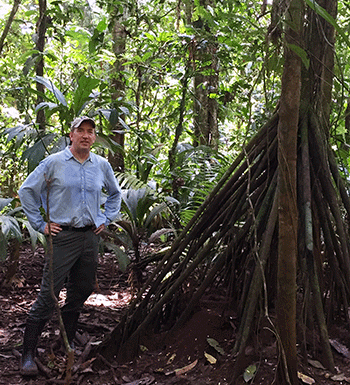
The Earth is changing, and humans face major challenges if they hope to adapt, survive and preserve any semblance of the world as it is now.
Humans will need to create sustainable food, water and energy supplies; curb climate change; eliminate pollution and waste; and design efficient, healthy and resilient cities. To support these efforts, they will also need to enhance society’s ability and will to make informed decisions and act; and develop leaders who are prepared to address a sustainable future.
The new “Environmental Engineering for the 21st Century: Addressing the Grand Challenges” report commissioned by the National Academies of Sciences, Engineering and Medicine features the work of nearly 20 of the country’s most prominent scientists, policy experts and environmental engineers — including UC Merced Professor Thomas Harmon. There will be a a live event in Washington, D.C. on Thursday in which authors will discuss the report and recommendations, and the event will be webcast. Signups are being taken online.
National Academies reports are meant to serve among the nation’s highest advisory documents, and the reports are available to the public. The report offers ideas about the critical roles environmental engineers will play in overcoming or managing these challenges.
Humans have always manipulated the environment to meet their needs, often with negative consequences, but now people need to find sustainable ways to fill those needs.
“It’s human behavior that’s going to save us,” Harmon said.
Environmental challenges continue to multiply as the global population expands toward 10 billion people by 2050. More people means greater demand for resources, and scientists are only beginning to understand all the challenges climate change presents.
“We’re going to need to take a systems approach to everything,” Harmon explained. “UC Merced has a great chance to get in front of this because we began with an interdisciplinary and environmentally-oriented perspective, and everything we do pivots toward sustainability.”
The study was sponsored by the National Science Foundation, the Department of Energy and the Delta Stewardship Council, and the committee had representatives from practicing engineers, nonprofit institutions, and universities, including UC Merced, University of Michigan, University of Virginia, University of Colorado, Columbia University, Georgia Institute of Technology, Cornell University, Yale University and others.

The committee members considered input from the scientific community, nongovernmental organizations and the broader public, and had access to work done by other scientists and engineers who had contemplated “grand challenges.”
After starting with more than 450 ideas about what the grand challenges should be, the group chose five broad, interconnected challenges that need to be addressed to ensure people and ecosystems thrive. For each, committee members discussed areas where knowledge and technological advances are needed and provided examples of potential roles for environmental engineers.
“The challenges shouldn’t be shocking to anyone, but environmental engineering has traditionally been a reactive field, addressing problems after they arise,” Harmon said. “This report is us putting out a call to our colleagues and the greater community, saying it’s time to be proactive.”
The sixth and “ultimate” challenge identified by the group focuses on educating future environmental engineers to use more holistic (systems) thinking to deal with questions of water, carbon sequestration, renewable energy, urban infrastructure, air quality, food sources and supplies and policies and practices. It also emphasized the need for broader interdisciplinary skills in next generation of environmental engineers.
“We need to better equip our students to collaborate with people from vastly different fields, such as social sciences, the arts, psychologists, economists and others to develop solutions and answers that people will be able to understand and embrace,” Harmon said. “We’ll need to tweak curriculums to teach students to mine the ever-expanding big data stream to help address problems, and to look at problems from a socio-environmental perspective.”
Harmon, a founding faculty member with the School of Engineering, Chair of the Department of Civil & Environmental Engineering and an affiliate of the Sierra Nevada Research Institute, said policies and practices are crucial and hard to achieve, but attainable.
“I think of all the questions we face in day-to-day life. Plastic or paper? Drive or take the bus? Sustainable food that takes time to cook or carry-out so I can get back to work?” he said. “I feel most people tend to do the right things if supporting information is readily available and credible.
“Making the information available is not a problem, but we have a lot of work to do to find the answers and communicate them well.”
Lorena Anderson

Senior Writer and Public Information Representative
Office: (209) 228-4406
Mobile: (209) 201-6255






